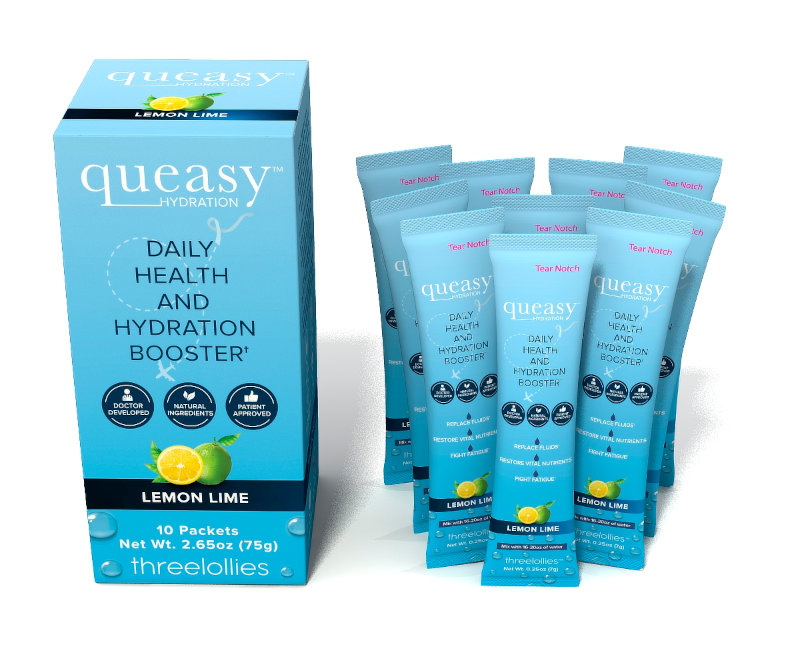Queasy Hydration

September 26th, 2023 | Cancer, Diet
Battling Dehydration Naturally
If you are undergoing treatment for cancer, you are probably well aware that you may experience nausea and vomiting. What you may not know as much about is the importance of avoiding the dehydration that can accompany these symptoms. If not identified and corrected, dehydration can impact your health and your treatment plan. According to Mila Buckley from the MD Anderson Cancer Center, “Staying hydrated makes treatment side effects less severe and lowers your chances of missing or delaying cancer treatments.”1
Identifying Dehydration
A challenge is that dehydration is not always easy to identify. Early signs can include headache, dizziness, fatigue, decreased need to urinate, or darker colored urine. Being thirsty is a relatively late sign of dehydration, so if you are thirsty, you may already have a significant fluid deficit.
Because of the importance of avoiding dehydration, the doctors at Three Lollies, maker of the Queasy™ line, an assortment of natural, drug-free products that help ease nausea, wanted to find a way to help people avoid dehydration simply and easily. As Dr. Pathman, CEO of ThreeLollies said, “Our mission is to support people on their cancer journey, in whatever way we can.” Under his leadership, his team developed Queasy Hydration, a delicious, easy to use, powder mix that when added to water provides essential electrolytes, minerals, vitamin C, amylase (to aid digestion) amino acids (to support muscle and tissue repair) and an ingredient that Three Lollies had not used before – Fucoidan.
How Queasy Hydration Works
Fucoidan is a substance found in several types of brown seaweed and sea cucumber. It has been used for over 2000 years by practitioners of Traditional Chinese Medicine and has been classified as a “Generally Recognized as Safe” food product by the FDA. A review done by the College of Life and Environmental Sciences studied the research that had been done on fucoidan’s effect on numerous conditions, including cancer, and stated that fucoidan showed some potential to inhibit cancer growth and showed some promise as a cancer therapeutic agent.3
Queasy Hydration can be a safe and effective tool in helping you prevent and reduce dehydration during your treatment. In addition to using Queasy Hydration, Mila Buckley from MD Anderson Cancer Center1 offers the following additional steps you can take to ensure adequate fluid intake:
- If you can drink fluids orally, it’s highly recommended that you do so throughout the day. This is easier than having to receive hydration through an IV.
- Tracking your fluid intake with a log is a great way to make sure you are meeting your individual needs so you can reduce your risk of dehydration.
- Water is best when it comes to hydrating. If you don’t like to drink water, flavored waters or waters infused with fruit or vegetables can make your water taste better.
- You can also get some of the fluid you need from other beverages like milk, sports drinks, tea, coffee, and moist foods like soup, jello, yogurt, sherbet, and pudding.
- Don’t eat greasy, fried, sweet, or spicy foods if you feel sick after eating them. If the smell of food bothers you, ask others to make your food. Try cold foods that do not have strong smells, or let food cool down before you eat it.
We wish you the best on your cancer journey. If you are interested in getting more information on any of our products, please visit us at https://threelollies.com/queasy-products/.
Sources
- Buckley, M. C. (2019, August 29). Cancer treatment side effect: Dehydration. MD Anderson Cancer Center. https://www.mdanderson.org/cancerwise/cancer-treatment-side-effect–dehydration.h00-159305412.html#:~:text=These%20may%20be%20signs%20of,due%20to%20increased%20fluid%20needs.
- Luthuli, Sibusiso et al. “Therapeutic Effects of Fucoidan: A Review on Recent Studies.” Marine drugs vol. 17,9 487. 21 Aug. 2019, doi:10.3390/md17090487
- Luthuli, S., Wu, S., Yang, C., Zheng, X., Wu, M., & Tong, H.(2019). Therapeutic Effects of Fucoidan: A review on recent studies. Marine Drugs, 17(9), 487. https://doi.org/10.3390/
Recent Posts
- Vegan and Vegetarian Nausea Relief: Best Plant-Based Remedies and Tips for 2025
- Essential Packing List for Pregnant Travelers 2025 | Comfort, Health & Safety Guide
- Natural Ingredients for Pregnancy Nausea Relief: Safe Morning Sickness Tips for 2025
- Do Allergies Cause Nausea? How Allergy Symptoms Affect Your Stomach in 2025
- First Trimester Morning Sickness Relief: Expert Tips to Ease Nausea in 2025
Categories
- All-Natural (4)
- Blog (47)
- Cancer (69)
- Diet (14)
- Holidays (20)
- Lifestyle (64)
- Motion Sickness (39)
- Nausea (73)
- New Mothers (33)
- Oncology Testimonials (3)
- Prebiotics (1)
- Preggie Products (6)
- Preggie Testimonial (23)
- Pregnancy (132)
- Queasy Products (8)
- Queasy Testimonial (16)
